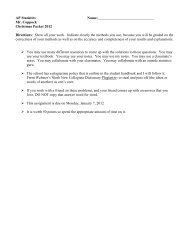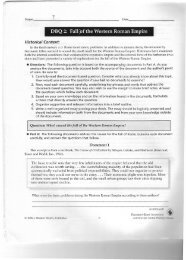Forensic Investigation Curriculum (pdf) - Darien Public Schools
Forensic Investigation Curriculum (pdf) - Darien Public Schools
Forensic Investigation Curriculum (pdf) - Darien Public Schools
Create successful ePaper yourself
Turn your PDF publications into a flip-book with our unique Google optimized e-Paper software.
Course Overview<br />
<strong>Forensic</strong> Science 300: The Science of <strong>Forensic</strong> <strong>Investigation</strong><br />
Grades 11-12<br />
1 semester<br />
½ credit<br />
Prerequisite: Successful completion of Biology (any level)<br />
Description: This course will introduce the concept of applying the methodology of<br />
sound scientific practice to issues pertaining to the law. Topical units will include an<br />
overview of forensic science and career paths, crime scene protocol, fingerprinting, DNA<br />
fingerprinting, serology (blood typing and pattern analysis), forensic anthropology and<br />
odontology, forensic toxicology, hair and fibers, forensic entomology, other trace<br />
evidence including pollen, spores, glass, paint, document analysis, and ballistics.<br />
Expectations: Students will be expected to participate in group work; to follow<br />
directions and safe laboratory protocol; to complete all homework assignments and lab<br />
reports and turn in on time; to conduct themselves in a professional and mature manner<br />
with respect to subject material; to complete and/or make up all quizzes, tests, and<br />
projects on time; to employ deductive and critical thinking skills in case studies and labs;<br />
to set up a crime scene for other students; to solve a crime scene.<br />
ESSENTIAL QUESTIONS<br />
1. How is science as a discipline defined by its process?<br />
2. How does an individual observe, record, analyze, interpret, make predictions and<br />
form conclusions based upon their observations?<br />
3. How is the scientific method used in forensic investigation?<br />
4. How are basic concepts in biology, chemistry, physics, and earth science applied in<br />
forensic investigation?<br />
5. What determines a crime scene, and how is it controlled?<br />
6. What constitutes physical evidence, and how is it recognized, collected, stored, and<br />
analyzed?<br />
7. How is physical evidence used in a court of law?<br />
6



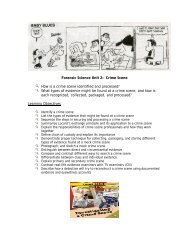
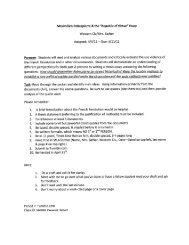

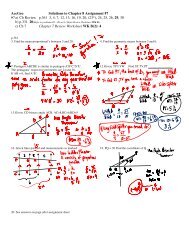


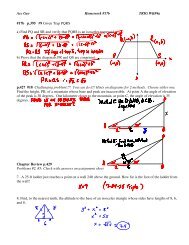
![Name Independent Practice Worksheet 23.]](https://img.yumpu.com/13527672/1/190x245/name-independent-practice-worksheet-23.jpg?quality=85)

